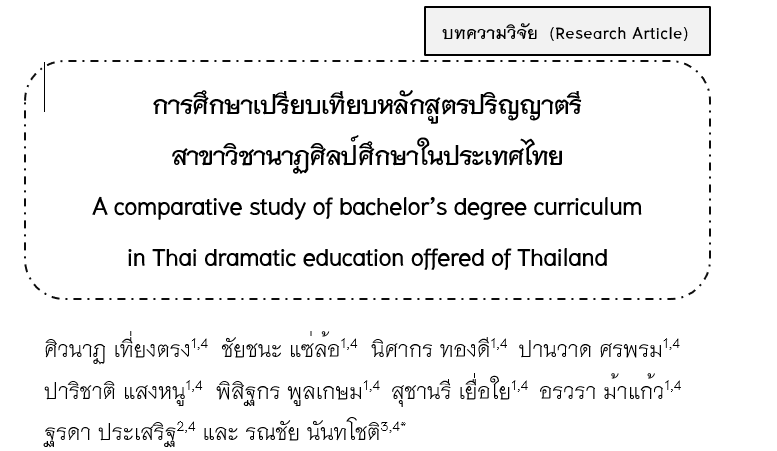A Comparative Study of Bachelor’s Degree Curriculum in Thai Dramatic Education Offered of Thailand
Keywords:
Comparative Study, Thai Dramatic Education, Bachelor’s Degree CurriculumAbstract
The comparative study of the Bachelor’s degree curriculum in Thai dramatic education has 3 purposes including the study of curriculum, analyzing and comparing the identity of curriculum, and proposing the guidelines for the development of Bachelor's degree curriculum in Thai dramatic education of Thailand. This study is based on Thai Qualifications Framework for higher education (TQF: HEd) No. 2 by Bereday's comparative education theory (1964). The results show that the identity of each curriculum is similar and has different parts corresponding to the study results of curriculum comparison and effect on the variety of characteristic graduate students. The guidelines for development of the Thai dramatic education curriculum are to import or develop educational of dramatic technology to participate on teaching and learning, to add courses that support the life skills in the 21st century, to promote the language and communication skills with an emphasis on laying the foundation for a third language. The curriculum determines the topics of the seminar in dramatic arts according to student interest and adding English proficiency tests according to the standards set by the institute. This research will be useful for the person who is interested in the comparative study of Thai dramatic education to demonstrate the differences and can be used as a guideline for improving and developing the Bachelor's degree curriculum in Thai dramatic studies of the institution of education in Thailand afterward.
References
กระทรวงศึกษาธิการ. (2553). หลักสูตรแกนกลางการศึกษาขั้นพื้นฐาน พุทธศักราช 2551 (พิมพ์ครั้งที่ 3). กรุงเทพฯ: โรงพิมพ์ชุมนุม สหกรณ์การเกษตรแห่งประเทศไทย จำกัด.
กัลย์ธีรา สุภนิธิ และ ปรีญานันท์ พร้อมสุขกุล. (2561). การศึกษาเปรียบเทียบหลักสูตรปริญญาโท สาขาวิชาดนตรีศึกษาของมหาวิทยาลัยในประเทศไทย. วารสารครุศาสตร์ จุฬาลงกรณ์มหาวิทยาลัย, 46(4), 22.
ประกาศกระทรวงศึกษาธิการ เรื่อง เกณฑ์มาตรฐานหลักสูตรระดับปริญญาตรี พ.ศ. 2558. (2558, 13 พฤศจิกายน). ราชกิจจานุเบกษา. เล่ม 132 ตอนพิเศษ 295 ง. หน้าที่ 4.
ประกาศกระทรวงศึกษาธิการ เรื่อง มาตรฐานคุณวุฒิระดับปริญญาตรี สาขาครุศาสตร์และสาขาศึกษาศาสตร์ (หลักสูตรสี่ปี) พ.ศ. 2562. (6 มีนาคม 2562). ราชกิจจานุเบกษา. เล่ม 136 ตอนพิเศษ 56 ง. หน้าที่ 12.
วรพรรณ กีรานนท์. (2540). การวิเคราะห์หลักสูตรนาฏศิลป์ศึกษา ระดับปริญญาตรีของสถาบันอุดมศึกษา. (บัณฑิตวิทยาลัย ครุศาสตรมหาบัณฑิต). กรุงเทพฯ: จุฬาลงกรณ์มหาวิทยาลัย.
วัฒนาพร ระงับทุกข์. (2563). สมรรถนะเด็กไทยในยุคโลกพลิกผัน (VUCA World). วารสารคุรุสภาวิทยาจารย์, 1(1), 9.
สงัด อุทรานันท์. (2532). พื้นฐานและหลักการพัฒนาหลักสูตร (พิมพ์ครั้งที่ 4). กรุงเทพฯ: มิตรสยาม.
สุภางค์ จันทวานิช. (2551). วิธีการวิจัยเชิงคุณภาพ. กรุงเทพฯ: สํานักพิมพ์แห่งจุฬาลงกรณ์มหาวิทยาลัย.
Bereday, G. Z. F. (1964). Comparative method in education. New York: Holt Rinehart and Winston.
Walker, D. F. (1990). Fundamentals of curriculum. San Diego: CA. Harcourt Brace Jovanovich.

Downloads
Published
How to Cite
Issue
Section
License
Copyright (c) 2023 Phayao University

This work is licensed under a Creative Commons Attribution-NonCommercial-NoDerivatives 4.0 International License.
ผู้นิพนธ์ต้องรับผิดชอบข้อความในบทนิพนธ์ของตน มหาวิทยาลัยพะเยาไม่จำเป็นต้องเห็นด้วยกับบทความที่ตีพิมพ์เสมอไป ผู้สนใจสามารถคัดลอก และนำไปใช้ได้ แต่จะต้องขออนุมัติเจ้าของ และได้รับการอนุมัติเป็นลายลักษณ์อักษรก่อน พร้อมกับมีการอ้างอิงและกล่าวคำขอบคุณให้ถูกต้องด้วย
The authors are themselves responsible for their contents. Signed articles may not always reflect the opinion of University of Phayao. The articles can be reproduced and reprinted, provided that permission is given by the authors and acknowledgement must be given.







